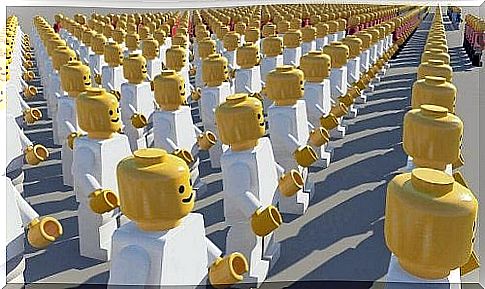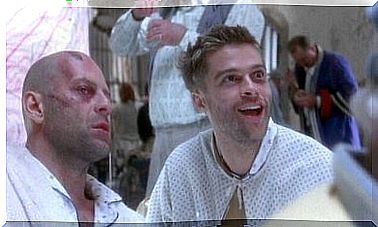1984: Novel By George Orwell

The 1984 novel , along with Animal Farm , is George Orwell’s most famous work. This writer presents us with a very interesting political literature with psychological overtones. Orwell is famous for his ideology based on Democratic Socialism (not to be confused with Social Democracy) and anti-totalitarianism. For this reason, he went to Spain to fight fascism in the POUM army during the civil war; story he tells in his book Homage to Catalonia .
1984 is a dystopian novel based on a system of government called Socing (the British Socialist Party). This government creates a society based on information control, where the key premise is: “Whoever controls the present controls the past and whoever controls the past will control the future”. It is currently considered a great work to reflect on current society and ask ourselves how far we have become an Orwellian society.
In his novel Orwell presents us with a series of psychologically very attractive concepts or ideas. In this article we analyze some of them. Specifically, we will talk about: (a) double-thinking, (b) Newspeak and (c) a company based on the control of information.

The double thought of 1984
One of the central aspects of population control in Socing is double thinking. Double-thinking refers to the power or the faculty of simultaneously supporting two contradictory opinions, two contrary beliefs that reside simultaneously in the same person.
The population is educated in double-thinking so that it can accept contradictions and understand their practical existence. In the controlling society of 1984 the artifices of the totalitarian state are not hidden, the population is taught to accept and deny them together. This is reflected in the three terms that Socing poses :
The ultimate goal of double-thinking is for individuals to realize it automatically. That they are able to keep two contradictions in their heads, without realizing that they are contradictory. Is this what happens in real life? Are there some syllogisms between double thought and our way of thinking? And this is precisely where the psychological interest of double-thinking comes into play.
Plenty of studies have shown us that our brains hold contradictory ideas. Festinger’s theory of cognitive dissonance speaks of the fact that, on a multitude of occasions, we have dissonant ideas, but there are mechanisms to ignore or resolve that dissonance. Double-thinking would be a way of rationalizing dissonances in order to live with them.
Currently, we use double-thinking more than we can imagine, and governments take advantage of it to some extent. A clear example is the existing hostility towards terrorist attacks, while, at the same time, many of our states (protected by the governments we vote for) also carry out acts of the same nature and even sell weapons to these terrorist groups. Extreme care must be taken, given that the rationalization of contradictions is an automatic process that is easy and, at times, unconscious actualization.
The Newspeak of Socing
Another key aspect presented in 1984 is thought control. To achieve this, the Ingsoc seeks to alter the language so the thought will become practical and is of no use reasoning. If people think too much, double thinking would break, and this would lead to the destruction of the state order. Following the Sapir-Whorf hypothesis, Orwell explains to us that, by changing language, it is possible to change the human mind.
Socing reduces language to its greater simplicity, making it uniquely a totally pragmatic means of communication. Synonyms and antonyms lose their meaning; no longer interested in transmitting and communicating the nuances of words that lead to value judgments and interpretations. Antonyms, for example, generate conflicts and reasoning arises from conflict; a demonstration of this can be to remove the word “war” from the dictionary and speak only in terms of more or less peace.

The lesson we can extract from Newspeak for our lives is the dangers of language. Language is capable of altering our perception and our thinking. Therefore, a political discourse can seem very different to us depending on the words that form it; when a politician tries to use words like “democracy”, “constitutional”, “peace” and place himself on the opposite side of words like “attack” or “war”, regardless of his program, he is trying to win the sympathy of the citizen. For this reason, it is important to explore reasoning and not fall prey to the superficial but powerful inspiration of language.
The company based on the control of information
In 1984 , the “Big Brother” is always vigilant and controls everything. Citizens are monitored everywhere, even in their homes. Even in the family, children are educated to watch over their parents and report them if they commit a crime. A key aspect of control is the manipulation of information.
For the Socing, the past can be rewritten to check the stability of the government. In the novel there is the Ministry of Truth which is dedicated to changing all writings, periodicals or books to favor “Big Brother” in this way; if “Big Brother” says that the rations of chocolate increase when in reality they are less than before, they change the data of the past so that it really looks like this.
Today we are not immune to the manipulation and control of information. Mass media such as television, radio or periodicals are often controlled by parties or governments that alter information to influence citizens’ opinions. Yes, ours. For this reason, any information or reading requires a minimum of prudence and a lot of reflection.
Orwell, in 1984 , offers us a very interesting dystopian society with great parallels with the current one. It is important to reflect on them and see the perversion of our society. To avoid evolving towards an Orwellian world , it is important to maintain a critical view of the mechanisms of influence and persuasion. So that these can occur without being a victim.









